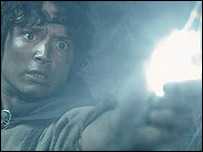
The Return of the King won an Oscar in every category it was nominated for
|
Brian Sibley, the man who first dramatised JRR Tolkien's The Lord of the Rings for BBC radio over 20 years ago, says JRR Tolkien would have approved of the Oscars record-breaking film trilogy.
Sibley is also the writer of the official guide to Peter Jackson's Lord of the Rings films - the final instalment, The Return of the King, won an unprecedented 11 prizes in 11 categories at this year's Academy Awards.
When Mr Sibley travelled half-way round the world in the 1999 he was astonished to find the mysterious world inhabited by hobbits really did exist.
He had in fact been granted unlimited access to the set of the first Lord of the Rings film, The Fellowship of the Ring, in New Zealand. The attention to detail he found astonished him.
"Tolkien would have at least approved of this. The film-makers wanted to create something that is fantastic, but is also rooted in realism," he said.
"It has that ring of authenticity about it."
Imagination
The original sword-and-sorcery blockbuster was written nearly half a century ago by the Oxford professor of languages and devout Roman Catholic, JRR Tolkien.
Selling somewhere in excess of 100 million copies, the tale has grown to be an international bestseller.
Mr Sibley believes its appeal may lie in its ability to transport the reader into another world.
"The story is rather like an onion," he explained, "where you peel back one layer and there is a another layer underneath."

Sibley's other radio drama adaptations include Gormenghast
|
But he feels the story should not be dismissed as a mere fantasy.
"This is not a cosy story. It is a story about peril and adventure with a terrible burden on it," he said.
"It seems to be part of our past. Tolkien was adamant that Middle Earth was not some parallel universe that you reach by going through the wardrobe or down the rabbit hole, it's a world that did once exist."
The Hobbit - the precursor to the The Lord of the Rings - enjoyed great and instant success when it was published, in 1937.
It marked the start of a quest that led to the diminutive hobbit Frodo being guided through Middle Earth by Gandalf and a fellowship of travellers.
Frodo's task is to destroy the all-powerful ring that the dark lord Sauron covets.
Reality
Central to the story is a battle between good and evil; concepts, which Mr Sibley believes, are not abstract, but derived from the author's real life experiences.
 |
 Once you have made the journey with Frodo I don't think that you are ever the same again
Once you have made the journey with Frodo I don't think that you are ever the same again

|
"From the year in which the Hobbit and these little characters appeared, through to when he finished the book, you see the Spanish Civil War, the rise of the totalitarian state, the rise of fascism which inevitably led to World War II and were played out every day," he said.
"Those are the things that in his idyllic little peaceful world of Oxford, Tolkien couldn't help but be aware and they are the undercurrent to this story."
Mr Sibley also places great importance of Tolkien's own experiences of war in shaping the story.
"He had fought in the battle of the Somme. The loss of his parents also made him more introspective and that definitely had a hand in the creation of these imaginary languages and realms that he wrote about."
But will Tolkien's tales survive the test of time?
"I see no diminution of this book. Once you have made the journey with Frodo I don't think that you are ever the same again."

